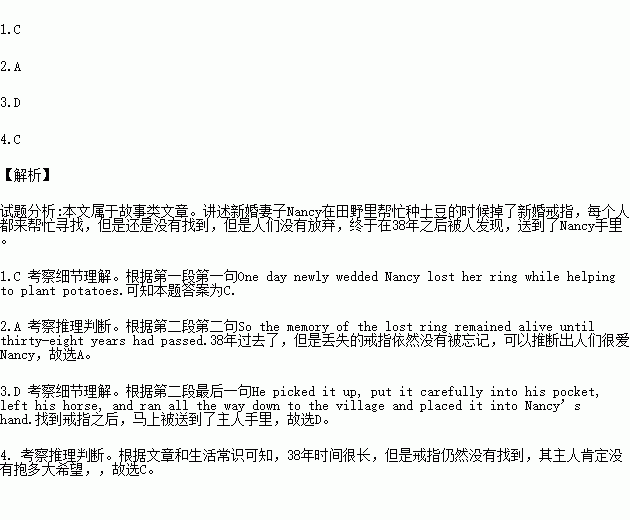题目内容
One day newly wedded Nancy lost her ring while helping to plant potatoes. Friends were called and the field was searched long but in vain(徒劳). Later, when the potatoes were harvested, Everyone looked out for the ring but it remained lost. Another year came round and all the farmers working in the field kept their eyes open. The following year was the same. And year after year, whoever had business in the field always had Nancy’s ring in his mind.
Then the farm changed hands but it went no farther than to cousins. So the memory of the lost ring remained alive until thirty-eight years had passed. Then came a spring day when a man was ploughing the field behind a pair of horses. Even after thirty-eight years he still looked out for the ring, and knew just which part of the field Nancy had lost it in. At this time, when he came there, he found it .He picked it up, put it carefully into his pocket, left his horse, and ran all the way down to the village and placed it into Nancy’s hand.
1.How did Nancy come to lose her ring?
A. She lost it while helping to harvest tomatoes in the field
B. She lost it while working in the field.
C. She lost it while helping to plant potatoes in the field.
D. She lost it while watering the plants in the field.
2.Why did people keep looking for the ring even after the farm changed hands?
A. They all loved Nancy.
B. They all wanted to solve the mystery.
C. It was a very expensive ring
D. Everybody wanted to have this ring.
3.What did the ploughman do after finding the ring?
A. He picked it up and put it in his pocket.
B. He ran back to tell everybody in the village.
C. He placed it in a secret spot.
D. He returned it to the owner.
4.What can you infer from the story?
A. The ring was invaluable.
B. The ring’s disappearance was the work of supernatural power.
C. People on the farm were honest and helpful.
D. Nancy no longer expected that her ring would be found again.

